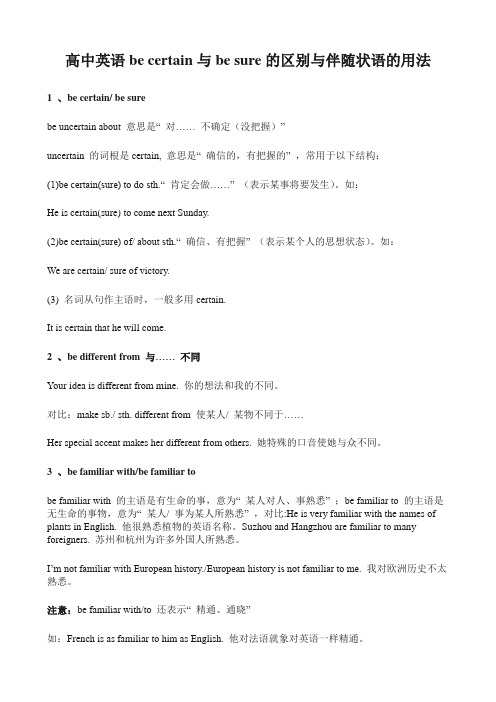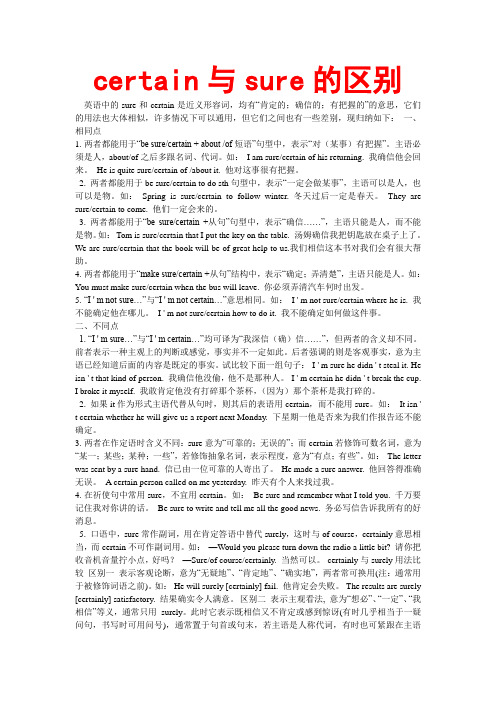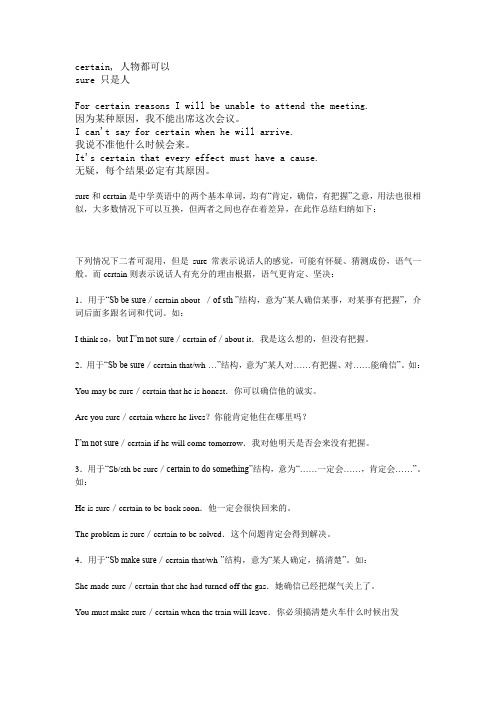sure和certain的比较用法
名校版英语经典句型考点解析 certain与sure

名校版英语经典句型考点解析certain与surecertain与sure各种句型用法完美解析1、两者都可用作表语,表示“一定”或“确信”,一般可互换。
用法上注意以下几点:(1) 后接不定式时,表示说话人的看法,意为“一定会”、“肯定会”、“一定要”。
如:He’s certain [sure] to win. 他一定会成功。
He’s certain [sure] to come. 他肯定会来。
They are sure to win this basketball match.他们肯定能打赢这场篮球赛。
《外研社英语同义词辨析词典》She's sure to be picked for the team.她肯定会入选该队。
《牛津高阶英汉双解词典》She is sure to come.她一准来。
Be sure to wear the correct footwear to prevent injuries to your feet.一定要穿合适的鞋,以免脚受伤。
《牛津高阶英汉双解词典》Before leaving the city, be sure to make time for a shopping trip离开城市之前,一定要留出时间去买些东西。
《柯林斯高阶英汉双解学习词典》Be sure to select firm, unblemished fruit.一定要选坚实、无疤痕的果子。
If you make a threat be sure to carry it out if he errs again.如果你作出威胁,在他再犯错时,一定要说到做到。
Be sure to make copies of all the papers.一定要把所有文件都复印好副本。
《外研社英语同义词辨析词典》Be sure to make this point clear to everyone.务使大家明了这一点。
高中英语be certain与be sure的区别与伴随状语的用法

高中英语be certain与be sure的区别与伴随状语的用法1 、be certain/ be surebe uncertain about 意思是“ 对…… 不确定(没把握)”uncertain 的词根是certain, 意思是“ 确信的,有把握的” ,常用于以下结构:(1)be certain(sure) to do sth.“ 肯定会做……” (表示某事将要发生)。
如:He is certain(sure) to come next Sunday.(2)be certain(su re) of/ about sth.“ 确信、有把握” (表示某个人的思想状态)。
如:We are certain/ sure of victory.(3) 名词从句作主语时,一般多用certain.It is certain that he will come.2 、be different from 与…… 不同Your idea is different from mine. 你的想法和我的不同。
对比:make sb./ sth. different from 使某人/ 某物不同于……Her special accent makes her different from others. 她特殊的口音使她与众不同。
3 、be familiar with/be familiar tobe familiar with 的主语是有生命的事,意为“ 某人对人、事熟悉” ;be familiar to 的主语是无生命的事物,意为“ 某人/ 事为某人所熟悉” ,对比:He is very familiar with the names of plants in English. 他很熟悉植物的英语名称。
Suzhou and Hangzhou are familiar to many foreigners. 苏州和杭州为许多外国人所熟悉。
of course 与surede的区别

certain与sure的区别英语中的sure和certain是近义形容词,均有“肯定的;确信的;有把握的”的意思,它们的用法也大体相似,许多情况下可以通用,但它们之间也有一些差别,现归纳如下:一、相同点1.两者都能用于“be sure/certain + about /of短语”句型中,表示“对(某事)有把握”。
主语必须是人,about/of之后多跟名词、代词。
如:I am sure/certain of his returning. 我确信他会回来。
He is quite sure/certain of /about it. 他对这事很有把握。
2. 两者都能用于be sure/certain to do sth句型中,表示“一定会做某事”,主语可以是人,也可以是物。
如:Spring is sure/certain to follow winter. 冬天过后一定是春天。
They are sure/certain to come. 他们一定会来的。
3. 两者都能用于“be sure/certain +从句”句型中,表示“确信……”,主语只能是人,而不能是物。
如:Tom is sure/certain that I put the key on the table. 汤姆确信我把钥匙放在桌子上了。
We are sure/certain that the book will be of great help to us.我们相信这本书对我们会有很大帮助。
4.两者都能用于“make sure/certain +从句”结构中,表示“确定;弄清楚”,主语只能是人。
如:You must make sure/certain when the bus will leave. 你必须弄清汽车何时出发。
5.“I ' m not sure…”与“I ' m not certain…”意思相同。
如:I ' m not sure/certain where he is. 我不能确定他在哪儿。
certain和sure的区别

certain, 人物都可以sure 只是人For certain reasons I will be unable to attend the meeting.因为某种原因,我不能出席这次会议。
I can't say for certain when he will arrive.我说不准他什么时候会来。
It's certain that every effect must have a cause.无疑,每个结果必定有其原因。
sure和certain是中学英语中的两个基本单词,均有“肯定,确信,有把握”之意,用法也很相似,大多数情况下可以互换,但两者之间也存在着差异,在此作总结归纳如下:下列情况下二者可混用,但是sure常表示说话人的感觉,可能有怀疑、猜测成份,语气一般。
而certain则表示说话人有充分的理由根据,语气更肯定、坚决:1.用于“Sb be sure/certain about /of sth ”结构,意为“某人确信某事,对某事有把握”,介词后面多跟名词和代词。
如:I think so,but I”m not sure/certain of/about it.我是这么想的,但没有把握。
2.用于“Sb be sure/certain that/wh-…”结构,意为“某人对……有把握、对……能确信”。
如:You may be sure/certain that he is honest.你可以确信他的诚实。
Are you sure/certain where he lives?你能肯定他住在哪里吗?I”m not sure/certain if he will come tomorrow.我对他明天是否会来没有把握。
3.用于“Sb/sth be sure/certain to do something”结构,意为“……一定会……,肯定会……”。
如:He is sure/certain to be back soon.他一定会很快回来的。
sure与certain用法浅析

,
t
a
in 19
的意 思
.
例如
in
y
:
Be
一
e e r ta
o 、1 e a
tc
h yo
u r
t
。
r a
in
o n
l
im
e
.
你
、
定要 设法按时赶上 火车
二者的意
”
六 作定 语 时
、
义
、
一般 不
同
。
S
r u
。
作 定 语 时 一 般 表 示 可靠的
, “ ” ,
,
“
、
可依赖的 无 误的
2 0 ZI 22
s u r e
yo
t
o
。
do
r
n
’
r to
。
z, s
t
y
s o o
(;
f
r
飞 。 n z
l
。
一
定 别 打 搅 他 们 任何 人
t
.
Be
s u
r e
w
it
e
m
o
a s
n
a s
y
o u
ge*
li
e r e
。
你一 到 那 儿 就 务 必 给 我 来 信
t e r c
e e r a
n l
a e 偶 尔 用 于 祈 使句 表 示 一 定 要 设 法 的 意 思 相 当 于 短 语 m k
10
.
It
’
5
a
lm
o s
t
e e r
Sure与Certain区别

• 4.在口语中,sure可作副词,用在肯定答 语中,相当于surely,certainly, of course, 而 certain不能用作副词,如:Are you going Sure/Certainly.你去吗 当然啦 •
• 3. 人+“be sure/certain +that从句”句型中,表示 “确信……”,主语只能是人,而不能是物。 • Tom is sure/certain that I put the key on the table. 汤姆确信我把钥匙放在桌子上了。 We are sure/certain that the book will be of great help to us.我们相信这本书对我们会有很大帮助。 I'm sure/certain that he'll come.
• Wherever there is disease, that woman is ______ to be seen. • A. sure B. certain C. there D. surely • 人称后面加 be sure 应译成“确信”,是主观认 that woman is sure to be seen. 确信那女人会在现场。 that woman is certain to be seen. 确定那女人在现场。 从题目 的表达来看,是一种客观叙述式,应该用certain。
• 注意:当sure或certain用于否定句时,其后 跟whether或连接代/副词引起的从句,不跟 that引起的从句。例如: I'm not sure/certain whether I've met him before. I'm not sure/certain whether he will come. I'm not sure/certain who he is. I was not sure/certain what I ought to do. I'm not sure/certain why he wants it.
certain与sure

certain ['s ə:t ən]意思:adj①确凿的,无疑的,确信1、be certain to do 肯定,有把握做……2、be certain(uncertain) of/about … 对……有把握(无把握)3、be certain+从句4、make certain (of) 把……弄清楚5、It is certain that …It was certain that our football team would win the game.如是否定句,用whether ,不用that 。
例如:It is not certain whether he will come. ②某一,某些Hunting is legal only in certain seasons.打猎只有在某些季节才是合法的。
So from the beginning we learn to be a certain way or to wear certain clothes.所以从一开始我们就要学习走一条特定的路或是穿特定的衣服。
sure [ʃu ə, ʃɔ:]1、be sure to do (疑问词+不定式),务必要干……,确信,一定Tom is sure to pass the driving test.I ’m not sure what to buy.我拿不准……2、 be sure of/about 确信……,有把握I ’m sure of his honesty.I ’m not sure about 2 subjects.区别:be sure to do 是别人对主语的判断;而be sure of 是主语对自己的判断。
3、be sure +从句(that,where,when,what,if,whether 等),确信……I’m sure that the meeting will be successful/a success.We are not sure whether/if they will come tomorrow.4、 make sure ⎩⎨⎧+)(从句of 查明,弄清楚,确保…… make sure of the place and date of the meeting.Make sure the door is shut.5、It is sure that …为错误句型。
confident、positive、sure、certain、convinced

同义词辨析:c o n f i d e n t、p o s i t i v e、s u r e、c e r t a i n、c o n v i n c e d导航意思: 确信的confident:解析: confident 指确信某事会以自己想要或期望的方式发生的,通常作表语。
例句: The French football team is confident of victory.翻译: 法国足球队对取胜很有把握。
例句: They are confident next year's profits will be higher.翻译: 他们确信明年的利润会增加。
positive:解析: positive 指对某事物的正确性或真实性绝对肯定的,通常作表语,可单独用作肯定回答,常后接介词about/of 或 that 从句。
例句: He can't be positive where he lost his key.翻译: 他说不准是在哪里丢的钥匙。
例句: She is absolutely positive that she opened the window.翻译: 她绝对肯定她开窗户了。
sure:解析: sure 指主观上对某事物的正确性或真实性没有疑虑的,常可与certain 换用,但语气稍弱,通常作表语。
例句: Are you sure/certain that this is the right road?翻译: 你肯定这条路对吗?例句: I am sure/certain that he is honest.翻译: 我肯定他是诚实的。
certain:解析: certain 指确定无疑的,表示说话人有确切的理由或不容置疑的证据,语气较强,通常作表语,多用于肯定句或正式的书面语中,常可与positive 换用,但不可单独用作回答。
例句: He is absolutely certain/positive that he has met her before.翻译: 他绝对肯定他以前见过她。
- 1、下载文档前请自行甄别文档内容的完整性,平台不提供额外的编辑、内容补充、找答案等附加服务。
- 2、"仅部分预览"的文档,不可在线预览部分如存在完整性等问题,可反馈申请退款(可完整预览的文档不适用该条件!)。
- 3、如文档侵犯您的权益,请联系客服反馈,我们会尽快为您处理(人工客服工作时间:9:00-18:30)。
英语中的sure和certain是近义形容词,均有“肯定的;确信的;有把握的”的意思,它们的用法也大体相似,许多情况下可以通用,但它们之间也有一些差别,现归纳如下:
一、相同点
1. 两者都能用于“be sure/certain + about /of短语”句型中,表示“对(某事)有把握”。
主语必须是人,about/of之后多跟名词、代词。
如:
I am sure/certain of his returning. 我确信他会回来。
He is quite sure/certain of /about it. 他对这事很有把握。
2. 两者都能用于be sure/certain to do sth句型中,表示“一定会做某事”,主语可以是人,也可以是物。
如:
Spring is sure/certain to follow winter. 冬天过后一定是春天。
They are sure/certain to come. 他们一定会来的。
3. 两者都能用于“be sure/certain +从句”句型中,表示“确信……”,主语只能是人,而不能是物。
如:
Tom is sure/certain that I put the key on the table. 汤姆确信我把钥匙放在桌子上了。
We are sure/certain that the book will be of great help to us.我们相信这本书对我们会有很大帮助。
4. 两者都能用于“make sure/certain +从句”结构中,表示“确定;弄清楚”,主语只能是人。
如:
You must make sure/certain when the bus will leave. 你必须弄清汽车何时出发。
5. “I ' m not sure…”与“I ' m not certain…”意思相同。
如:
I ' m not sure/certain where he is. 我不能确定他在哪儿。
I ' m not sure/certain how to do it. 我不能确定如何做这件事。
二、不同点
1. “I ' m sure…”与“I ' m certain…”均可译为“我深信(确)信……”,但两者的含义却不同。
前者表示一种主观上的判断或感觉,事实并不一定如此。
后者强调的则是客观事实,意为主语已经知道后面的内容是既定的事实。
试比较下面一组句子:
I ' m sure he didn ' t steal it. He isn ' t that kind of person. 我确信他没偷,他不是那种人。
I ' m certain he didn ' t break the cup. I broke it myself. 我敢肯定他没有打碎那个茶杯,(因为)那个茶杯是我打碎的。
2. 如果it作为形式主语代替从句时,则其后的表语用certain,而不能用sure。
如:
It isn ' t certain whether he will give us a report next Monday. 下星期一他是否来为我们作报告还不能确定。
3. 两者在作定语时含义不同:sure意为“可靠的;无误的”;而certain若修饰可数名词,意为“某一;某些;某种;一些”,若修饰抽象名词,表示程度,意为“有点;有些”。
如:
The letter was sent by a sure hand. 信已由一位可靠的人寄出了。
He made a sure answer. 他回答得准确无误。
A certain person called on me yesterday. 昨天有个人来找过我。
4. 在祈使句中常用sure,不宜用certain。
如:
Be sure and remember what I told you. 千万要记住我对你讲的话。
Be sure to write and tell me all the good news. 务必写信告诉我所有的好消息。
5. 口语中,sure常作副词,用在肯定答语中替代surely,这时与of course,certainly意思相当,而certain不可作副词用。
如:
—Would you please turn down the radio a little bit? 请你把收音机音量拧小点,好吗?
—Sure/of course/certainly. 当然可以。
certainly与surely用法比较
区别一
表示客观论断,意为“无疑地”、“肯定地”、“确实地”,两者常可换用(注:通常用于被修饰词语之前)。
如:
He will surely [certainly] fail. 他肯定会失败。
The results are surely [certainly] satisfactory. 结果确实令人满意。
区别二
表示主观看法, 意为“想必”、“一定”、“我相信”等义,通常只用surely。
此时它表示既相信又不肯定或感到惊讶(有时几乎相当于一疑问句,书写时可用问号),通常置于句首或句末,若主语是人称代词,有时也可紧跟在主语之后。
如:
You can do something to help him, surely. 你总可以想点办法帮他一下吧。
Surely that‟s Jim over there? I thought he was in Paris. 那边想必是吉姆吧? 我还以为他在巴黎呢!
You surely [Surely you] don‟t believe that. 想必你不会相信那种话吧。
比较:
That‟s certainly a plain-clothes policeman. 那肯定是个便衣警察。
(表客观论断)
Surely that‟s a plain-clothes policeman. 那一定是个便衣警察吧。
(表示主观看法)
注:若用于否定句,则更强调说话者的怀疑态度,可译为“不见得会”、“不一定会”。
如:
Surely you are not going alone. 你不见得会一个人去吧!
of course
一定,当然
=without doubt
of course在口语中的用法
表示:当然;自然。
如:
He was late again,of course. 自然他又迟到了。
Of course I…ll help you. 我当然会帮你。
Of course,I wish both of you well. 当然我希望你们俩身体健康。
He was joking. Of course I…m not a poet. 他是在开玩笑,我当然不是诗人。
通常在对话中用作回答。
如:
A:Are you coming with us?你和我们一起去吗?
B:Of course. 当然啦。
A:Will you be able to come to the meeting?你能来开会吗?
B:Of course. 当然能来。
A:May I book your dictionary?我可借你的字典吗?
B:Yes,of course. 当然可以。
有时与not连用。
如:
A:Were you glad to leave?你愿意离开吗?
B:Of course not. 当然不愿意。
A:Do you want lost the game?你起输掉这场比赛吗?
B:Of course not. 当然不想。
adv.(副词)
1. certainly用于修饰动词,表示同意所陈述的事或确信某事是真实的。
2. certainly在句中的位置,如果有助动词(be, do, have等),一般放于助动词之后。
如果
表示否定,一般放于助动词之前。
也可位于句首或句末,表示强调。
3. certainly作“当然”解是非正式用语,多见于口语; 作“必定”解是正式用语,口语和书面
语均可使用。
这个问题同样困扰了我很久,老师当时给我们的解释是,这两个词都含有“假的”之意。
fake 只是指某物不是真的,客观上是假的,而false说明某物与真的相像,强调看上去像真的,加上一些主观的感情色彩,所以:
fake的话,这句话翻成:观众观看的电视剧中,有些不过是对现实的虚假反映。
false的话,这句话翻成:观众观看的电视剧中,有些呈现的是假象(强调对观众造成误导)。
或许从True False, Fake Real(真假虚实)的角度也可以稍作理解。
